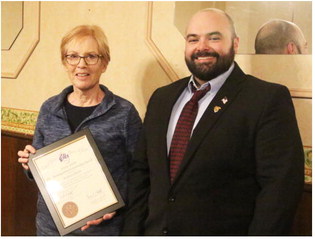TikTok Ban Brings Questions About Sovereignty In State
Now that the governor has signed a controversial bill essentially outlawing the TikTok social media app in Montana, Indigenous people in the state are wondering how such a law might affect sovereign tribal nations.
Montana Gov. Greg Gianforte signed into law on Wednesday, May 17, a bill banning the Chinese-owned social media application. Specifically, Senate Bill 419, is designed to ban state residents from downloading the app within “territorial jurisdiction” of the state, which is expected to go into effect in 2024.
“The Chinese Communist Party using TikTok to spy on Americans, violate their privacy, and collect their personal, private, and sensitive information is well-documented,” Gov. Gianforte stated in a press release last week. “Today, Montana takes the most decisive action of any state to protect Montanans’ private data and sensitive personal information from being harvested by the Chinese Communist Party.”
The TikTok ban is a controversial idea, with opponents calling it a violation of the First Amendment. In fact, a group of TikTok users filed a lawsuit against the governor just hours after he signed the bill, alleging the state lacks the authority to bar people from accessing information, according to a CNN story. But the idea has sparked some in Indian Country to ask if tribal sovereignty extends to technology, specifically data.
Federally recognized tribes hold a high level of sovereignty as outlined in treaties with the U.S. government. Tribes invoke that sovereignty when they create and manage their governments, police forces or education systems. Whether that sovereignty includes data is yet to be tested.
“It’s not something that a lot of people have thought about,” said Maranda Compton, a citizen of the Delaware Tribe of Indians and adjunct law professor at the University of Montana. “What is Montana’s digital jurisdiction? You go talk to state legislators, they’re like, ‘I don’t know,’ they have no idea. So I think these are technologies that we’re all getting kind of used to and understanding, and the problem in particular for tribes is that so often tribal jurisdiction is dictated in geographic terms.”
Compton also has her own consulting company, Lepwe, which provides strategic advice to tribal nations seeking to assess and assert their data and digital tribal sovereignty.
Digital and data sovereignty are relatively new concepts that tribal nations are coming face-to-face with in order to protect and control their online information on their own terms — an authority that is integrated within tribal sovereignty.
Compton said tribes need to be part of the conversations when dealing with laws and policies that may overreach jurisdiction and that the TikTok ban is a prime example of what happens when tribal sovereignty enters into a digital space.
“I think when you look at bills like this, what has happened in the past in Indian Country is that if we as Native people, as Native lawyers, as tribal leaders and elected officials, if we leave our rights in the hands of state and federal actors to be defined by state and federal actors, they will be ignored,” Compton said.
In 2018, the National Congress of American Indians passed a resolution that encourages tribes to exercise Indigenous data sovereignty and governance and supports the inclusion of tribes in the development of any broad principles of tribal data sovereignty. The resolution described Indigenous data sovereignty as “the right of each tribe to govern the collection, ownership, and application of data, information, and knowledge about its peoples, land and resources.”
For now, only time will tell how tribal nations will handle the statewide ban.

